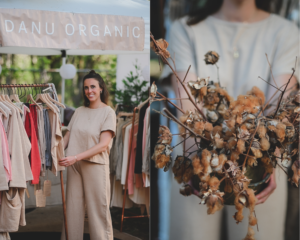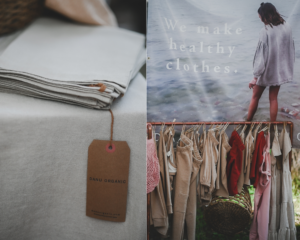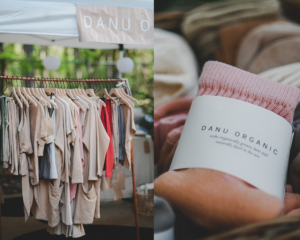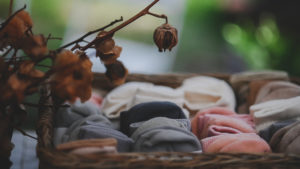Written and photographed by Koa Kalish

Danu Organic is a one-woman owned clothing company created by Sarah Danu. The word danu is the name of the earth goddess of Ireland, and Sarah’s company hails both from her heritage as well as to the land from which she walks and sources her clothes.
During her 20’s, Sarah experienced complex and mysterious health issues, with many symptoms displaying on her skin. She recalls a time when she bought a new underwear set in the color red. It was beautiful, yet after wearing it once she found her skin had concerningly become the same color red. “I realized that my skin was chemically dyed red, and I had an epiphany, ‘this can’t be truly organic if it is dyed with chemicals that will stay in my skin for days.’”
For two years, Sarah battled with strange autoimmune issues. If she walked fast, she would break into full-body hives. Terrified, she could not figure out what was going on. “Healthy clothes were a huge part of my healing journey,” she says.

Through Fibersehd, Sarah was led to meet Sally Fox, master pioneer of organic and non-GMO cotton breeding and farming. Sally introduced Sarah to her colorful cottons in red, green, peach, and tan colors — ancient strains of Gossypium, which Sally has miraculously kept alive and vibrant in the Capay Valley of California for the last 30-40 years.
“Sally’s love for her work is so deep; the commitment is extraordinary,” says Sarah. “I don’t think many people commit to something as much as Sally has committed to this cotton, which is so inspiring. This plant is a solution for people today, for future generations, and the earth. Sally has done so much to move this work forward in the face of huge, repetitive obstacles.”
Mystified, Sarah recalls her awe. “You can get color for clothing from just plant fibers?” Thus began a massive transformation process of Sarah cleaning up her wardrobe, and inspired her to set out on a mission to create healthy clothing. Her motives are not only for her own health but for the Earth’s, as she knows they are inseparable.

Sarah is passionate about educating how fashion is taken for granted, in terms of its impact on the earth, our communities, and our own lives. “Most clothes are made of plastic,” Sarah explains. “They are absolutely unsustainable, and truly so toxic. There are so many labels calling themselves ‘sustainable’ but are made of plastic and chemical dyes that are actually not sustainable or organic whatsoever.”
“Our skin is our largest organ,” explains Sarah. “It’s well accepted that medicine is given through skin, (patches, creams, etcetera). But people somehow don’t have the awareness that our skin is absorbing all the time. Skincare is applied once or twice a day, but wearing a shirt is for 24 hours. Clothing has a huge impact on the health of our skin. Additionally, our skin is a detox organ. If we are wearing toxic clothing, we are essentially ‘toxing’ our detox organ.”
Lastly, Sarah exposes the effects of the clothing industry and the greater community. “There is a whole supply chain that’s not only unseen, but purposely hidden, because it’s ugly,” she states. “When you buy a shirt, does it have an impact on another person? Yes. Most all clothes are handmade. If you’re buying chemically dyed clothing, the dye is the most toxic part. Chemical dyes are extracted from petroleum and people are handling, and getting ill from the process. Another big health problem in clothing factories is that there are millions of microplastic dust particles in the air from cutting fabric, creating toxic dust the people sewing breathe in, creating respiratory issues. This is mostly happening in other countries, so the customers don’t have any idea that someone, somewhere is getting sick.”

After seeing the ugly, now, Sarah is creating solutions, and finding the beauty. “When I felt the cotton plant, I just fell in love,” she remembers. “It is an honor to work with plants in this way. The cotton is so special. Why would we dye something that color if we can work directly with the plant? It’s extra work to dye it and extra cost— financially and for the earth.”
“I’ve stopped trying to save the world,” she says. “Instead, I try to do as little harm and bring as much joy and happiness as possible. At Danu, we are minimizing harm in our design choices, which we share transparently with our customers.”
Around the time of the first launch of Danu, when she’d been wearing little but her sample Hida Mountain Pants & Barcelona Pullover for the prior year, Sarah’s health symptoms cleared completely. “I love the work that I get to do every day, and I don’t know that I would have been here without going through that difficult personal health journey,” she says.
Find Danu Organic clothing online here: www.danuroganic.com or join the Danu community on Instagram.
